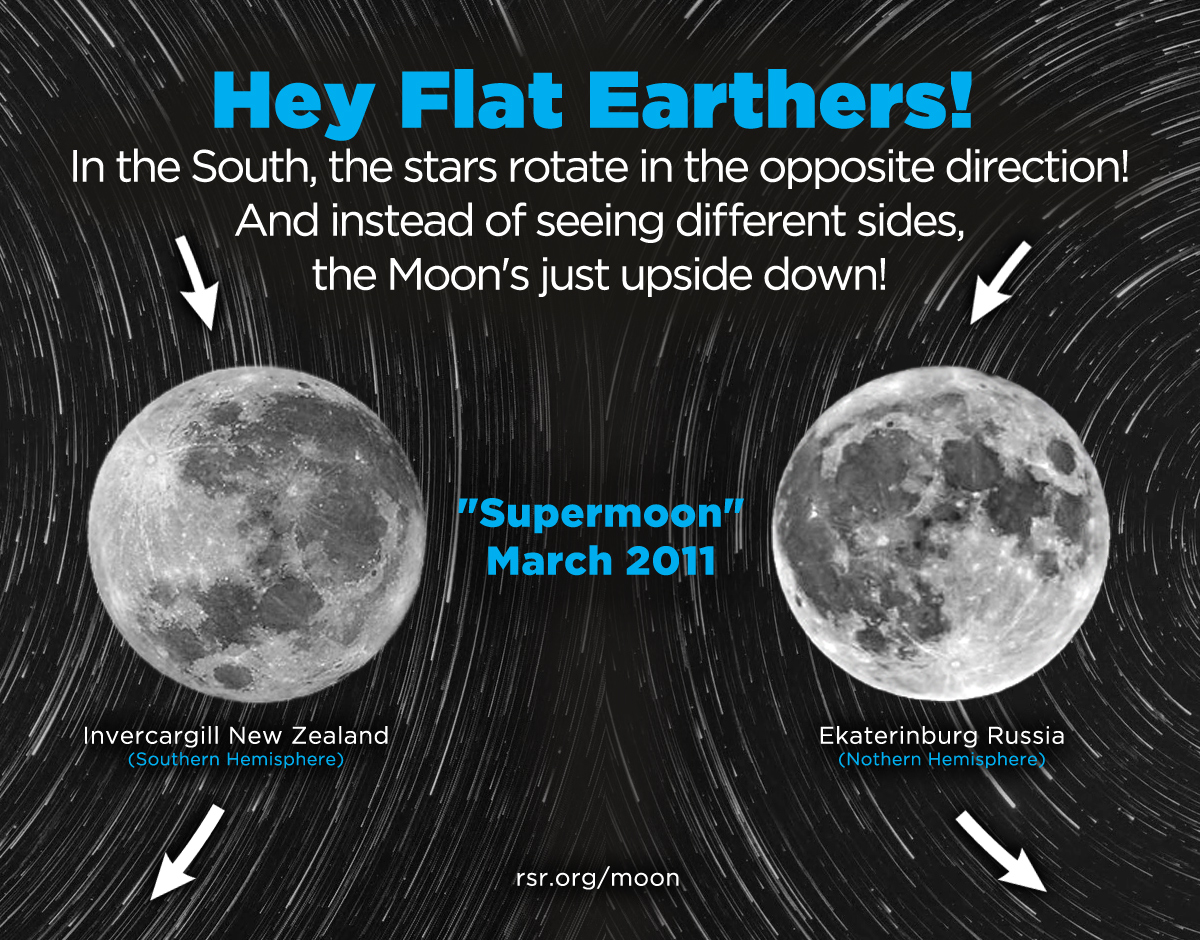 * Flat Earth Society President Believes in Darwinism: As reported by LiveScience and in Creation magazine's Fall 2011 issue, the Flat Earth Society's president Daniel Shenton not only believes that the earth is flat, but he also believes in global warming and Darwinian evolution. Ha! The irony, of course, is that evolutionists mock creationists by asking if we believe in a flat earth, whereas the Flat Earth Society itself aligns itself not with creationists but with evolutionists.
* Flat Earth Society President Believes in Darwinism: As reported by LiveScience and in Creation magazine's Fall 2011 issue, the Flat Earth Society's president Daniel Shenton not only believes that the earth is flat, but he also believes in global warming and Darwinian evolution. Ha! The irony, of course, is that evolutionists mock creationists by asking if we believe in a flat earth, whereas the Flat Earth Society itself aligns itself not with creationists but with evolutionists.
* Christian Religious Orders that Taught a Flat Earth: Which of the Christian religious orders through history that taught that the earth is flat (for example, which among the Franciscans, Dominicans, Augustinians, Benedictines, Trappists, Carmelites), and which of the Protestant denominations taught that, and which schools of the Eastern Orthodox, and which of the Popes of the Roman Catholic Church taught that, and which of the councils taught that, and which of the creeds taught that, and which of the dozens of colleges and universities of the Reformation, and which of the church's leading theologians taught that, including Augustine, Aquinas, Luther, Calvin, etc? Answer: NONE OF THEM. Millions of atheists, etc., have alleged that the church has historically taught a flat earth either because those materialists are uneducated or because they are willing to make false accusations. See below, the links for University of California history professor Dr. Jeffrey Russell's writings Inventing the Flat Earth and The Myth of the Flat Earth. Today though, combining the negative effects of social media with the low-quality science education of our public schools, and we have a global phenomenon whereby, for example, 10% of the population of France (a secular society) is unsure about a spherical Earth, and remember, as per above, according to LiveScience the president of the Flat Earth Society Daniel Shenton is a Darwinist.
* Stars Rotating in Opposte Directions: From rsr.org/flat-earth, for anyone suffering with this ailment, consider this. Compared to viewing it from the northern hemisphere, the night sky shows the stars rotating in the opposite direction while the Moon appears upside down, from the southern hemisphere, which is a simple cure for the flat earth syndrome.

* 2018 RSR Flat Earth Program: Addressing the flat-earth delusion, hear Real Science Radio's Fred Williams interview creation speaker Pete Fiske.
* Flat Earth, Geocentrism, and the Moon Landing Hoax: LiveScience reporter Natalie Wolchover offered to Shenton a NASA image of our western hemisphere which should lead the Darwinist flat-earthers to wonder where Europe, Africa, and Asia were hiding. And by the way, those who still claim that the sun orbits the earth have far more supporters than do the flat-earthers. For a rebuttal to that view, see rsr.org/geocentrism-rebuttal. And for a rebuttal to the moon landing hoax conspiracy claim, please see rsr.org/moon-landing-hoax-refuted.
 * UC History Prof. Debunks Myth of the Flat Earth: Dr. Jeffrey Russell, Professor of History at the University of California, Santa Barbara, has also taught history and religious studies at Berkeley, Harvard, and Notre Dame. His book, Inventing the Flat Earth, documents that in the 19th century a French archaeologist and an American essayist invented and spread the falsehood that educated people in the Middle Ages believed that the earth was flat. RSR notes that the anti-Christians spreading this fabrication allegedly include some of Darwin's promoters like David White, and that the targets of this smear included Christian scholars. Prejudice and myth die hard, and a small army of professional historians have been unable to correct this evolutionist libel against Christians. Toward that end however, see Dr. Russell's brief article, The Myth of the Flat Earth. Russell there mentions the widespread false belief that in 1491 Christopher Columbus faced inquisitors and theologians who held that the Earth was flat, which mini-myth has been widely debunked and identified as a pure invention of the author Washington Irving.
* UC History Prof. Debunks Myth of the Flat Earth: Dr. Jeffrey Russell, Professor of History at the University of California, Santa Barbara, has also taught history and religious studies at Berkeley, Harvard, and Notre Dame. His book, Inventing the Flat Earth, documents that in the 19th century a French archaeologist and an American essayist invented and spread the falsehood that educated people in the Middle Ages believed that the earth was flat. RSR notes that the anti-Christians spreading this fabrication allegedly include some of Darwin's promoters like David White, and that the targets of this smear included Christian scholars. Prejudice and myth die hard, and a small army of professional historians have been unable to correct this evolutionist libel against Christians. Toward that end however, see Dr. Russell's brief article, The Myth of the Flat Earth. Russell there mentions the widespread false belief that in 1491 Christopher Columbus faced inquisitors and theologians who held that the Earth was flat, which mini-myth has been widely debunked and identified as a pure invention of the author Washington Irving.
* Isaiah: God "sits above the circle of the earth": From above, and from every direction, a solid sphere can only be viewed as a circle. Dominic Stratham's article, Isaiah 40:22 the Shape of the Earth, provides many indicators that khûg, the ancient Hebrew word used 2,700 years ago, typically translated into English as "circle", also means sphere. In modern Hebrew both khûg and kaddar mean sphere, as do similar words in other languages, whether possibly coincidental, or borrowed or cognate, as with Arabic kura (which word appears in this verse in the most popular Arabic Bible which was translated in 1865). An old German word kugel, the Polish word kula, and the Serbian/Croatian word kugla all mean sphere apparently from the Proto-Indo-European root gug. Also, the pre-modern era renderings of this word khûg as an orb include Bible translations in the 1500s, as sphaera.
* RSR Friends Richter, Carter, & Sarfati: For those tricked into believing in a flat earth, over at creation.com our friends have published a two-minute rescue video. Flat-earthers don't trust NASA (or their scientists like our friend Henry Richter). Yet of course dozens of nations are now involved in space exploration along with a growing number of private firms. If they wanted to, the flat-earthers could crowdfund a ticket to space for their leading author who could then see with his own eyes as he orbits the Earth. In CMI's fun video, Dr. Jonathan Sarfati points out that at night, folks in Germany, in the same timezone as those in South Africa, see the North Star while those in the southern hemisphere can't see the North Star but instead see the southern cross and the same constellations as seen from those in New Zealand in a different timezone. Further, Sarfati reminds us that Jesus, being the Creator, of course knew of the different time zones required by a spherical earth, and so in Matthew 24 the Lord speaks of His Second Coming that everyone on Earth will see, even those who were working in the fields and those who were asleep in bed:
* To the Claim that NASA Can't Be Trusted: The flat-earth community can find out directly, for themselves, that the Earth is a sphere rotating on its axis. How? Well, assuming that at least some flat-earthers are not destitute, they can pool their resources and buy a ticket to send one of their own, as a civilian tourist, into space. Then, having the word of someone perhaps they can trust, they can learn the truth (and stop embarrassing themselves). So:
- Flat-earthers, chip in some money, buy a ticket, and send one of your "experts" to the space station.
- Don't trust USA/NASA? Well, ten other nations, even North Korea, and the European Union, ALL go to space!
- Don't trust governments? Well, twenty private companies fly into space, like Virgin Galactic, Blue Origin, & SpaceX.
- Don't trust the view from the space station? Well, soon enough, you can buy a ticket to the moon.
* RSR's Related Resources:
- rsr.org/launch-a-flat-earther-into-space
- rsr.org/flat-earth-society president a Darwinist
- rsr.org/flat-earth interview with an astronomer
- rsr.org/which-popes-taught-a-flat-earth (none)
- rsr.org/flat-earthers-dont-take-the-bible-literally
- Moon Landing Conspiracy Hoax Refuted
- Rebutting Geocentrism
- The Cosmological Principle
- RSR's Interview with James Hannam on the medieval world
- RSR's The Firmament (raqia) of Day Two.
And remember that in the most ancient book in the Bible, at Job 26:7, written almost 4,000 years ago in the time of Abraham's great-grandchildren, we read an amazing statement consistent with astronomy's latest models of the solar system, that God "hangs the earth on nothing."
* There's Hope Even for Daniel Shenton: Even though this evolutionist runs the Flat Earth Society, there's hope for him. Consider this, from Bob Enyart's published paper, Dobzhansky: 40 Years Later Nothing Makes Sense:
[In his famed paper, Theodosius Dobzhansky's] first prediction regarded Saudi Arabia’s late Sheik Abd el Aziz bin Baz, who had recently insisted that the sun orbited the earth. Dobzhansky declared that it would be useless to present evidence to those who “fear enlightenment,” asserting that the Sheik was “so hopelessly biased that no amount of evidence would impress him” (Dobzhansky, 1973, p. 125). However, in 1985 the U.S. invited Prince Sultan bin Salman to fly aboard the space shuttle Discovery. Later, hearing a firsthand account of the evidence from a source that he trusted, bin Baz changed his mind, falsifying Dobzhansky’s prediction (Bin Baz, 2005).
* Fake Interview of Director Stanley Kubrick's Faked Moon Landing: Those vulnerable to the falsehoods of flat-earth proponents make themselves vulnerable to all kinds of hoaxes. For example, various versions of the fake interview of filmmaker Stanley Kubrick confessing to faking the moon landing have deceived many. Eventually, however, an uncut version, embedded here, was published. If you're interested, you'll especially want to see the section beginning at 12:19 into the video. Enjoy! :)
* Friends of Bob on the Flat Earth and Geocentrism: Check out Gary Bates's video with RSR friends Dr. Henry Richter, Rob Carter, and Jonathan Sarfati...
* RSR's List of Scientific Statements in the Bible:
- We'll use the list from Battle Royale VII when Bob debated Zakath
- God "hangs the earth on nothing" Job 26:7
- "Let there be lights in the firmament [including] the greater light to rule the day" Gen. 1:14-16
- "when you see the sun, the moon, and the stars" do not “worship them" Deut. 4:19 whereas much of the ancient world did worship the sun: Ra, Helios, Ar, Apollo, Sunna, Yan-Di, etc.
- "Can you bind the cluster of the Pleiades, or loose the belt of Orion?" Job 38:31 references to these constellations in the oldest book of the Bible, written at the time of Abraham's grandkids
- The dinosaurs behemoth and leviathan Job 40:15-23 and 41:1-9
- Evaporation and the water cycle: "All the rivers run into the sea, yet the sea is not full; to the place from which the rivers come, there they return again" Eccl. 1:7 and "There is a multitude of waters in the heavens: 'And He causes the vapors to ascend from the ends of the earth'" Jer. 10:13; 51:16 quoting Ps. 135:7.
- "And the Lord God formed man of the dust of the ground" Gen. 2:7 whereas ancient man had little understanding of the elements and none of atoms and molecules. What was human flesh made of? It was nothing like fire, air or water, and not like rock or wood. But modern chemistry from creationists Paracelsus, Robert Boyle, Francis Bacon, and John Dalton, can scientifically verify the Bible’s statement that we are made of dust, the same elements we find in the soil on the ground, no different.
- The Bible, by Adam's rib and the covenant of circumcision, disproved the evolutionists' Lamarckism claim that bodily changes were readily inheritable. In Genesis 17:12 God required circumcision throughout your "generations". So from Abraham to Christ, for about 2,000 years, every male infant had flesh cut off, yet that did not make circumcision heritable. And God made Eve from one of Adam's ribs (Gen. 2:21) and yet men still have their full complement of ribs.
* Lamarck's Limerick:
There once was an idiot from France,
Who couldn't find the seat of his pants.
He said he had solved
The way we evolved,
And got millions in government grants!
- God "made a law for the rain, and a path for the thunderbolt" (Job 28:26) obliquely references the laws of physics
- God through Moses in Leviticus 3500 years ago gave practical diagnosis and treatment instructions for the kinds of infectious diseases they were experiencing at that point in Israel's history. Diagnose from bodily discharges. Quarantine infected people. Observation. Extend observation period if symptoms persist. Cleansing with water. Clothing and personal items washed, discarded, or even burned. The inherent warning was that one person or object can infect another. All of this was revealed thousands of years before biblical creationists discovered for the world the germ theory of disease. (Undoubtedly these ideas were in biblical creationist Joseph Lister's mind when he laid the foundation for saving hundreds of millions of lives! The covid brough renewed attention to the Bible's astounding wisdom including instruction to quarantine those with symptoms, not those without!)
- Etc.
As you can learn reading the writings of Johann Kepler, Isaac Newton, and so many of our greatest scientists, in their opinion, the Bible is not antithetical to science. Unlike the eastern religions which relegate the universe to the realm of maya, illusion, Scripture supports science, Christianized Europe became the birthplace of modern science, and the Bible from ancient times has contained observations, some startling, of truths only the Creator could know.
* Pseudoscientific Claims Not in the Bible:
- See rsr.org/geocentrism
- See rsr.org/flat-earth
- See rsr.org/dome.
* "Warning: PZ Myers blog is filled with vulgarity, hatred, intolerance, references to defecation, etc.": Myers blogged this week against our PZ Trochlea Challenge, mocking Bob Enyart and RSR friend Will in the title of his blog. To his credit though, PZ acknowledged that he did not have an answer for us (below see trochlea diagram and challenge). Warning: PZ's blog is filled with vulgarity and constant references to defecation and sex acts, and the site's comments drip with hatred toward and intolerance of those who disagree. Three of Bob's comments at PZ's blog are also pasted below.
* PZ Wrote of Our Trochlea Challenge: "...Enyart has challenged me to explain how this feature evolved. I have an answer. It’s easy. I don’t know. I don’t see any obvious obstacle to an arrangement of muscles evolving, but I don’t know the details of this particular set." And as Bob posted at Myer's site (copied also below), PZ talking about whether or not the muscle could have attached without the trochlea is an obfuscation. Of course, that or any muscle could be fastened somewhere without first passing through a trochlea. Intentionally or not, PZ is missing the point of the trochlea diagram.
Also, in his previous blog against RSR, PZ Myers went ad hominin on us so we went all ad hominid on him.
* Major Description of New Dinosaur Created from 1/4-inch Bone: Do you remember when leading evolutionists promoted Nebraska Man, and described his height, abilities, social structure, tool use, amount of hair on his body, etc., when all they had actually discovered was a single tooth? Then later, after excavating more of the skeleton, the evolutionists (including from New York City's Museum of Natural History) realized it was the tooth of a pig. Well, so do Bob and Fred!
 * Bob Enyart Interviews AronRa: Continuing with AronRa's Foundational Falsehood videos, Bob talks to one of the web's leading anti-creationists. In today's program, AronRa denies the existence of dinosaur soft tissue, and he rejects Bob's argument that a lack of evidence would not prove the negative, as in today's discussion regarding whether or not the universe has a center.
* Bob Enyart Interviews AronRa: Continuing with AronRa's Foundational Falsehood videos, Bob talks to one of the web's leading anti-creationists. In today's program, AronRa denies the existence of dinosaur soft tissue, and he rejects Bob's argument that a lack of evidence would not prove the negative, as in today's discussion regarding whether or not the universe has a center.









